trip
(trĭp)n.
1. A going from one place to another; a journey.
2. A stumble or fall.
3. A maneuver causing someone to stumble or fall.
4. A mistake.
5. Slang
a. A hallucinatory experience induced by a psychedelic drug: an acid trip.
b. An intense, stimulating, or exciting experience: a power trip.
6. Slang
a. A usually temporary but absorbing interest or preoccupation: He's on another health food trip.
b. A certain way of life or situation: "deny that his reclusiveness is some sort of deliberate star trip" (Patricia Bosworth).
7. A light or nimble tread.
8.
a. A device, such as a pawl, for triggering a mechanism.
b. The action of such a device.
v. tripped, trip·ping, trips
v.intr.
1. To stumble.
2. To move nimbly with light rapid steps; skip.
3. To be released, as a tooth on an escapement wheel in a watch.
4. To make a trip.
5. To make a mistake: tripped up on the last question.
6. Slang To have a drug-induced hallucination.
v.tr.
Idiom: 1. To cause to stumble or fall.
2. To trap or catch in an error or inconsistency.
3. To release (a catch, trigger, or switch), thereby setting something in operation.
4. Nautical
a. To raise (an anchor) from the bottom.
b. To tip or turn (a yardarm) into a position for lowering.
c. To lift (an upper mast) in order to remove the fid before lowering.
trip the light fantastic
To dance.
[Middle English, act of tripping, from trippen, to trip, from Old French tripper, to stamp the foot, of Germanic origin.]
American Heritage® Dictionary of the English Language, Fifth Edition. Copyright © 2016 by Houghton Mifflin Harcourt Publishing Company. Published by Houghton Mifflin Harcourt Publishing Company. All rights reserved.
trip
(trɪp)n
1. an outward and return journey, often for a specific purpose
2. any tour, journey, or voyage
3. a false step; stumble
4. any slip or blunder
5. a light step or tread
6. a manoeuvre or device to cause someone to trip
7. (Mechanical Engineering)
a. any catch on a mechanism that acts as a switch
b. (as modifier): trip button.
8. (Chemistry) a surge in the conditions of a chemical or other automatic process resulting in an instability
9. (Recreational Drugs) informal a hallucinogenic drug experience
10. informal any stimulating, profound, etc, experience
vb, trips, tripping or tripped
11. (often foll by: up, or when intr, by on or over) to stumble or cause to stumble
12. to make or cause to make a mistake or blunder
13. (often foll by: up) to trap or catch in a mistake
14. (intr) to go on a short tour or journey
15. (intr) to move or tread lightly
16. (Recreational Drugs) (intr) informal to experience the effects of LSD or any other hallucinogenic drug
17. (tr)
a. to activate (a mechanical trip)
b. trip a switch to switch electric power off by moving the switch armature to disconnect the supply
[C14: from Old French triper to tread, of Germanic origin; related to Low German trippen to stamp, Middle Dutch trippen to walk trippingly, trepelen to trample]
ˈtrippingly adv
Collins English Dictionary – Complete and Unabridged, 12th Edition 2014 © HarperCollins Publishers 1991, 1994, 1998, 2000, 2003, 2006, 2007, 2009, 2011, 2014
trip
(trɪp)n., v. tripped, trip•ping. n.
1. a traveling from one place to another; journey or voyage.
2. a journey or run made by a boat, train, or the like, between two points.
3. a single course of travel taken as part of one's duty, work, etc.: my weekly trip to the bank.
4. a stumble; misstep.
5. a sudden impeding or catching of a person's foot so as to throw the person down.
6. a slip, error, or blunder.
7. a light, nimble step or movement of the feet.
8. a projection on a moving part that strikes a control lever to stop, reverse, or control a machine, as a printing press.
9. Slang.
v.i. a. an instance or period of being under the influence of a hallucinogenic drug, esp. LSD.
b. the euphoria, hallucinations, etc., experienced during such a period.
c. a stimulating or exciting experience.
d. any experience.
e. any intense interest or preoccupation: She's been on a nostalgia trip all week.
10. to stumble: to trip on a toy.
11. to make a slip or mistake, as in conversation or conduct.
12. to step lightly or nimbly; skip.
13. to tip or tilt.
14. Slang. to be under the influence of a hallucinogenic drug, esp. LSD (often fol. by out).
v.t. 15. to cause to stumble (often fol. by up).
16. to cause to fail; obstruct.
17. to cause to make a slip or error (often fol. by up).
18. to catch in a slip or error.
19. to tip or tilt.
20. to break out (a ship's anchor) by turning over or lifting from the bottom by a line attached to the crown of the anchor.
21. to operate, start, or set free (a mechanism, weight, etc.) by suddenly releasing a catch, clutch, or the like.
22. to release or operate suddenly (a catch, clutch, etc.).
Idioms: trip the light fantastic, to go dancing.
[1350–1400; Middle English trippen to step lightly < Old French trip(p)er < Middle Dutch; compare early Dutch trippen, Dutch trippelen (frequentative with -el), akin to Old English treppan to tread]
Random House Kernerman Webster's College Dictionary, © 2010 K Dictionaries Ltd. Copyright 2005, 1997, 1991 by Random House, Inc. All rights reserved.
trip
- trip - A group of goats.
- rustication - A trip to the country.
- safari - From Swahili, from Arabic safar, "journey, trip."
- supplant - Literally means "trip up," from Latin supplantare, "trip up, overthrow."
Farlex Trivia Dictionary. © 2012 Farlex, Inc. All rights reserved.
Trip
a flock or troop; a brood or litter.Dictionary of Collective Nouns and Group Terms. Copyright 2008 The Gale Group, Inc. All rights reserved.
journey
– trip – voyage – excursion1. 'journey'
A journey is the process of travelling from one place to another by land, air, or sea.
There is a direct train from London Paddington to Penzance. The journey takes around 5 hours.
This service will save thousands of long-distance lorry journeys on Britain's roads.
2. 'trip'
A trip is the process of travelling from one place to another, staying there, usually for a short time, and coming back again.
Lucy is away on a business trip to Milan.
They went on a day trip to the seaside.
3. 'voyage'
A voyage is a long journey from one place to another in a ship or spacecraft.
The ship's voyage is over.
...the voyage to the moon in 1972.
4. 'excursion'
An excursion is a short trip made either as a tourist or in order to do a particular thing.
The tourist office organizes excursions to the palace.
5. verbs used with 'journey', 'trip', 'voyage' and 'excursion'
You make or go on a journey.
He made the long journey to India.
You take or go on a trip.
We took a bus trip to Manchester.
You make a voyage.
The ship made the 4,000-kilometre voyage across the Atlantic.
You go on an excursion.
Students went on an excursion to the Natural History Museum.
Be Careful!
Don't use 'do' with any of these words. Don't say, for example, 'We did a bus trip'.
Collins COBUILD English Usage © HarperCollins Publishers 1992, 2004, 2011, 2012
trip
Past participle: tripped
Gerund: tripping
| Imperative |
|---|
| trip |
| trip |
Collins English Verb Tables © HarperCollins Publishers 2011
ThesaurusAntonymsRelated WordsSynonymsLegend:
| Noun | 1. | 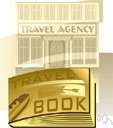 trip - a journey for some purpose (usually including the return); "he took a trip to the shopping center" trip - a journey for some purpose (usually including the return); "he took a trip to the shopping center"flight - a scheduled trip by plane between designated airports; "I took the noon flight to Chicago" journey, journeying - the act of traveling from one place to another junket - a trip taken by an official at public expense round trip - a trip to some place and back again run - a regular trip; "the ship made its run in record time" run - a short trip; "take a run into town" trek - any long and difficult trip errand - a short trip that is taken in the performance of a necessary task or mission service call - a trip made by a repairman to visit the location of something in need of service |
| 2. | 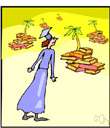 trip - a hallucinatory experience induced by drugs; "an acid trip" trip - a hallucinatory experience induced by drugs; "an acid trip"hallucination - illusory perception; a common symptom of severe mental disorder | |
| 3. | 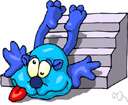 trip - an accidental misstep threatening (or causing) a fall; "he blamed his slip on the ice"; "the jolt caused many slips and a few spills" trip - an accidental misstep threatening (or causing) a fall; "he blamed his slip on the ice"; "the jolt caused many slips and a few spills" | |
| 4. | 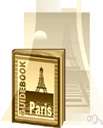 trip - an exciting or stimulating experience trip - an exciting or stimulating experienceexperience - an event as apprehended; "a surprising experience"; "that painful experience certainly got our attention" | |
| 5. | ||
| 6. |  trip - a light or nimble tread; "he heard the trip of women's feet overhead" trip - a light or nimble tread; "he heard the trip of women's feet overhead"step - the act of changing location by raising the foot and setting it down; "he walked with unsteady steps" | |
| 7. | 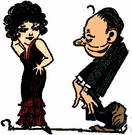 trip - an unintentional but embarrassing blunder; "he recited the whole poem without a single trip"; "he arranged his robes to avoid a trip-up later"; "confusion caused his unfortunate misstep" trip - an unintentional but embarrassing blunder; "he recited the whole poem without a single trip"; "he arranged his robes to avoid a trip-up later"; "confusion caused his unfortunate misstep" | |
| Verb | 1. | 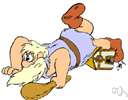 trip - miss a step and fall or nearly fall; "She stumbled over the tree root" trip - miss a step and fall or nearly fall; "She stumbled over the tree root"move - move so as to change position, perform a nontranslational motion; "He moved his hand slightly to the right" founder - stumble and nearly fall; "the horses foundered" |
| 2. |  trip - cause to stumble; "The questions on the test tripped him up" trip - cause to stumble; "The questions on the test tripped him up" | |
| 3. |  trip - make a trip for pleasure trip - make a trip for pleasure commute - travel back and forth regularly, as between one's place of work and home peregrinate - travel around, through, or over, especially on foot; "peregrinate the bridge" | |
| 4. |  trip - put in motion or move to act; "trigger a reaction"; "actuate the circuits" trip - put in motion or move to act; "trigger a reaction"; "actuate the circuits" | |
| 5. | 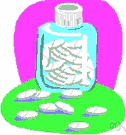 trip - get high, stoned, or drugged; "He trips every weekend" trip - get high, stoned, or drugged; "He trips every weekend" |
Based on WordNet 3.0, Farlex clipart collection. © 2003-2012 Princeton University, Farlex Inc.
trip
noun
1. journey, outing, excursion, day out, run, drive, travel, tour, spin (informal), expedition, voyage, ramble, foray, jaunt, errand, junket (informal), awayday On the Thursday we went out on a day trip.
2. stumble, fall, slip, blunder, false move, misstep, false step Slips, trips and falls were monitored using a daily calendar.
verb
1. stumble, fall, fall over, slip, tumble, topple, stagger, misstep, lose your balance, make a false move, lose your footing, take a spill She tripped and broke her hip.
2. skip, dance, spring, hop, caper, flit, frisk, gambol, tread lightly They tripped along without a care in the world.
3. (Informal) take drugs, get high (informal), get stoned (slang), get loved-up (informal), get off your face (slang), turn on (slang) One night I was tripping on acid.
trip someone up catch out, trap, confuse, unsettle, disconcert, throw you off, wrongfoot, put you off your stride Your own lies will trip you up.
trip up blunder, make a mistake, slip up (informal), make a faux pas, go wrong, lapse, boob (Brit. slang), err, miscalculate He has tripped up in Parliament before.
Collins Thesaurus of the English Language – Complete and Unabridged 2nd Edition. 2002 © HarperCollins Publishers 1995, 2002
trip
noun2. An act or thought that unintentionally deviates from what is correct, right, or true:
3. Slang. An illusion of perceiving something that does not really exist:
4. Slang. A temporary concentration of interest:
Slang: kick.
1. To catch the foot against something and lose one's balance:
Idioms: lose one's footing, make a false step.
3. To make or go on a journey:
Idiom: hit the road.
4. To release or move (a switch, for example) in order to activate, deactivate, or control a device:
trip up
The American Heritage® Roget's Thesaurus. Copyright © 2013, 2014 by Houghton Mifflin Harcourt Publishing Company. Published by Houghton Mifflin Harcourt Publishing Company. All rights reserved.
Translations
výletzakopnoutcestaklopýtnoutposkakovat
snubletrippeturrejse
matkakompastualaukaistareissuretki
putspotaknuti se
kiránduláslebegésutazás
ferî, ferîalaghrasatrítla
つまずく旅行
걸려 넘어지다여행
ekskursantaskulniuotitipenti
brauciensceļojumsklidzinātklupttipināt
excursievoiaj
izletpotovanjespotaknitispotakniti se
resasnubbla
การเดินทางสะดุด
chuyến đivấp
trip
[trɪp]A. N
1. (= journey) → viaje m; (= excursion) → excursión f; (= visit) → visita f; (= outing) → salida f
it's her first trip abroad → es su primer viaje al extranjero
it's a 100-mile trip → es un recorrido or un viaje de 100 millas
she's planning a trip round the world → está planeando hacer un viaje por todo el mundo
a trip to the park/seaside → una excursión or una salida al parque/a la playa
a trip to the cinema → una visita or una salida al cine
a trip to the doctor → una visita al médico
boat trip → paseo m or excursión f en barco
fishing trip → excursión f de pesca
to make a trip we made a trip into town → fuimos a la ciudad
he made several trips to the toilet → fue varias veces al servicio
she went on a trip to Tasmania → (se) fue de viaje a Tasmania
he's away on a trip → está de viaje
school trip → excursión f del colegio
shopping trip → visita f a las tiendas
to take a trip they took a trip to York → fueron de excursión a York
they took a trip to Canada → (se) fueron de viaje a Canadá
take a trip to your local library → hágale una visita a la biblioteca de su barrio, visite la biblioteca de su barrio
weekend trip → viaje m de fin de semana
to take a trip down memory lane → revivir el pasado
see also business, coach, day, field, round
it's her first trip abroad → es su primer viaje al extranjero
it's a 100-mile trip → es un recorrido or un viaje de 100 millas
she's planning a trip round the world → está planeando hacer un viaje por todo el mundo
a trip to the park/seaside → una excursión or una salida al parque/a la playa
a trip to the cinema → una visita or una salida al cine
a trip to the doctor → una visita al médico
boat trip → paseo m or excursión f en barco
fishing trip → excursión f de pesca
to make a trip we made a trip into town → fuimos a la ciudad
he made several trips to the toilet → fue varias veces al servicio
she went on a trip to Tasmania → (se) fue de viaje a Tasmania
he's away on a trip → está de viaje
school trip → excursión f del colegio
shopping trip → visita f a las tiendas
to take a trip they took a trip to York → fueron de excursión a York
they took a trip to Canada → (se) fueron de viaje a Canadá
take a trip to your local library → hágale una visita a la biblioteca de su barrio, visite la biblioteca de su barrio
weekend trip → viaje m de fin de semana
to take a trip down memory lane → revivir el pasado
see also business, coach, day, field, round
2. (on drugs) → viaje m
acid trip → viaje m de ácido
she had a bad trip → tuvo un mal viaje
see also ego, guilt
acid trip → viaje m de ácido
she had a bad trip → tuvo un mal viaje
see also ego, guilt
3. (= stumble) → tropezón m; (= move to make sb trip) → zancadilla f
he brought the other player down with a trip → hizo caer al otro jugador con una zancadilla
he brought the other player down with a trip → hizo caer al otro jugador con una zancadilla
4. (Elec) (also trip switch) → interruptor m de desconexión
B. VI
1. (= stumble) → tropezar
he tripped and fell → tropezó y se cayó al suelo
to trip on/over sth → tropezar con algo
see also trip over
he tripped and fell → tropezó y se cayó al suelo
to trip on/over sth → tropezar con algo
see also trip over
2. (liter) (= step lightly) she tripped gracefully round the dance floor → se movía con paso ligero y grácil por la pista de baile
to trip along; go tripping along → ir con paso ligero
to trip off the tongue it doesn't exactly trip off the tongue → no se puede decir que sea fácil de pronunciar
the formula came tripping off his tongue → pronunció la fórmula con la mayor facilidad
see also tongue A1
to trip along; go tripping along → ir con paso ligero
to trip off the tongue it doesn't exactly trip off the tongue → no se puede decir que sea fácil de pronunciar
the formula came tripping off his tongue → pronunció la fórmula con la mayor facilidad
see also tongue A1
C. VT
1. (also trip up) (= cause to stumble) (intentionally) → poner or echar la zancadilla a; (accidentally) → hacer tropezar
he tried to trip me → intentó ponerme or echarme la zancadilla
don't leave things on the stairs where they may trip you → no deje cosas en las escaleras donde se pueda tropezar
he tried to trip me → intentó ponerme or echarme la zancadilla
don't leave things on the stairs where they may trip you → no deje cosas en las escaleras donde se pueda tropezar
2. (also trip up) (= catch out) he was trying to trip her into contradicting herself → estaba intentando tenderle una trampa para que se contradijera
see also trip up B2
see also trip up B2
3. (= set off) [+ mechanism, switch] → activar
D. CPD trip switch N → interruptor m de desconexión
trip over
A. VI + ADV (= fall) → tropezar y caerse
he tripped over and fell flat on his face → tropezó y cayó de bruces
he tripped over and fell flat on his face → tropezó y cayó de bruces
B. VI + PREP
trip up
A. VI + ADV
1. (= stumble) → tropezar
2. (= make a mistake) → equivocarse
B. VT + ADV
1. (= cause to stumble) (intentionally) → poner or echar la zancadilla a; (accidentally) → hacer tropezar
2. (= cause to make a mistake) she tried to trip him up → intentó que se equivocase or que se confundiese
the fourth question tripped him up → la cuarta pregunta le hizo equivocarse or le confundió
the fourth question tripped him up → la cuarta pregunta le hizo equivocarse or le confundió
Collins Spanish Dictionary - Complete and Unabridged 8th Edition 2005 © William Collins Sons & Co. Ltd. 1971, 1988 © HarperCollins Publishers 1992, 1993, 1996, 1997, 2000, 2003, 2005
trip
[ˈtrɪp] n
(= journey) → voyage m (= excursion) → excursion f
have a good trip! → bon voyage!
to go on a trip → faire un voyage
We went on a trip to the Lake District
BUT Nous sommes allés dans le Lake District.
a day trip → une excursion d'une journée
a business trip → un voyage d'affaires
a school trip → un voyage scolaire
have a good trip! → bon voyage!
to go on a trip → faire un voyage
We went on a trip to the Lake District
BUT Nous sommes allés dans le Lake District.
a day trip → une excursion d'une journée
a business trip → un voyage d'affaires
a school trip → un voyage scolaire
(= experience) → délire m
power trip → délire mégalo
nostalgia trip → délire nostalgique, trip nostalgique
guilt trip → sentiment coupable
power trip → délire mégalo
nostalgia trip → délire nostalgique, trip nostalgique
guilt trip → sentiment coupable
(also acid trip) → trip m
vi
(= go lightly) → marcher d'un pas léger
vt
(by sticking one's foot out) → faire un croche-pied à
trip up
vi
(= stumble) → trébucher
(= make a mistake) → faire un faux pas
vt
(by sticking one's foot out) → faire un croche-pied à
(= catch out) → désarçonner
Collins English/French Electronic Resource. © HarperCollins Publishers 2005
trip
n
(= journey) → Reise f; (= excursion) → Ausflug m, → Tour f; (esp shorter) → Trip m; let’s go on a trip to the seaside → machen wir doch einen Ausflug ans Meer!, fahren wir doch ans Meer!; when was your last trip to the dentist’s? → wann waren Sie zuletzt beim Zahnarzt?; that’s his fifth trip to the bathroom already! → er geht jetzt schon zum fünften Mal auf die Toilette! (inf); he is away on a trip → er ist verreist or auf Reisen; she’s away on a trip to Canada → sie macht zur Zeit eine Reise nach Kanada; to take a trip (to) → eine Reise machen (nach), verreisen (nach)
(esp Sport) → Beinstellen nt; he didn’t fall, it was a trip → er ist nicht (von selbst) hingefallen, man hat ihm ein Bein gestellt
(Mech) → Auslösung f
vi
(fig) = trip up VI b
vt
trip
:trip recorder
n (Aut) → Tageszähler m
trip switch
n (Elec) → Sicherheitsschalter m
Collins German Dictionary – Complete and Unabridged 7th Edition 2005. © William Collins Sons & Co. Ltd. 1980 © HarperCollins Publishers 1991, 1997, 1999, 2004, 2005, 2007
trip
[trɪp]1. n
a. → viaggio; (outing) → gita; (excursion) → escursione f
(away) on a trip → in viaggio
to take a trip → fare un viaggio
she does 3 trips to Milan a week → va a Milano 3 volte alla settimana
I've made 2 trips to the shops already → sono già andata 2 volte a far la spesa
(away) on a trip → in viaggio
to take a trip → fare un viaggio
she does 3 trips to Milan a week → va a Milano 3 volte alla settimana
I've made 2 trips to the shops already → sono già andata 2 volte a far la spesa
b. (Drugs slang) → trip m inv, viaggio
c. (stumble) → passo falso
2. vi
a. (stumble) → inciampare
b. to trip along or go tripping along (skip) → andare saltellando; (move lightly) → camminare con passo leggero
3. vt = trip up 2
trip over
1. vi + adv → inciampare
2. vi + prep → inciampare in
trip up
1. vi + adv → inciampare (fig) (make a mistake) → fare un passo falso
2. vt + adv → far inciampare, fare lo sgambetto a
Collins Italian Dictionary 1st Edition © HarperCollins Publishers 1995
trip
(trip) – past tense, past participle tripped – verb1. (often with up or over) to (cause to) catch one's foot and stumble or fall. She tripped and fell; She tripped over the carpet.
2. to walk with short, light steps. She tripped happily along the road.
noun a journey or tour. She went on / took a trip to Paris.
ˈtripper noun a person who has made a journey for pleasure. The resort was full of trippers.
Kernerman English Multilingual Dictionary © 2006-2013 K Dictionaries Ltd.
trip
→ رِحْلَة, يُعَثِّرُ výlet, zakopnout rejse, snuble Reise, stolpern σκουντουφλώ, ταξίδι αναψυχής tropezar, viaje kompastua, matka trajet, trébucher put, spotaknuti se inciampare, viaggio つまずく, 旅行 걸려 넘어지다, 여행 reisje, struikelen tur, utløse podróż, potknąć się tropeçar, viagem путешествие, путешествовать resa, snubbla การเดินทาง, สะดุด ayağı takılmak, yolculuk chuyến đi, vấp 旅程, 绊倒Multilingual Translator © HarperCollins Publishers 2009
trip
1. n. viaje;
2. slang, uso de drogas alucinatorias.
English-Spanish Medical Dictionary © Farlex 2012
- Have a good trip!
- This is my first trip to ...
- A first class round trip to ... (US)
A first class return to ... (UK) - How long is the trip? (US)
How long is the journey? (UK) - The trip takes two hours (US)
The journey takes two hours (UK)
Collins Multilingual Translator © HarperCollins Publishers 2009
trip
vi (pret & pp tripped; ger tripping) tropezar, dar un traspiéEnglish-Spanish/Spanish-English Medical Dictionary Copyright © 2006 by The McGraw-Hill Companies, Inc. All rights reserved.